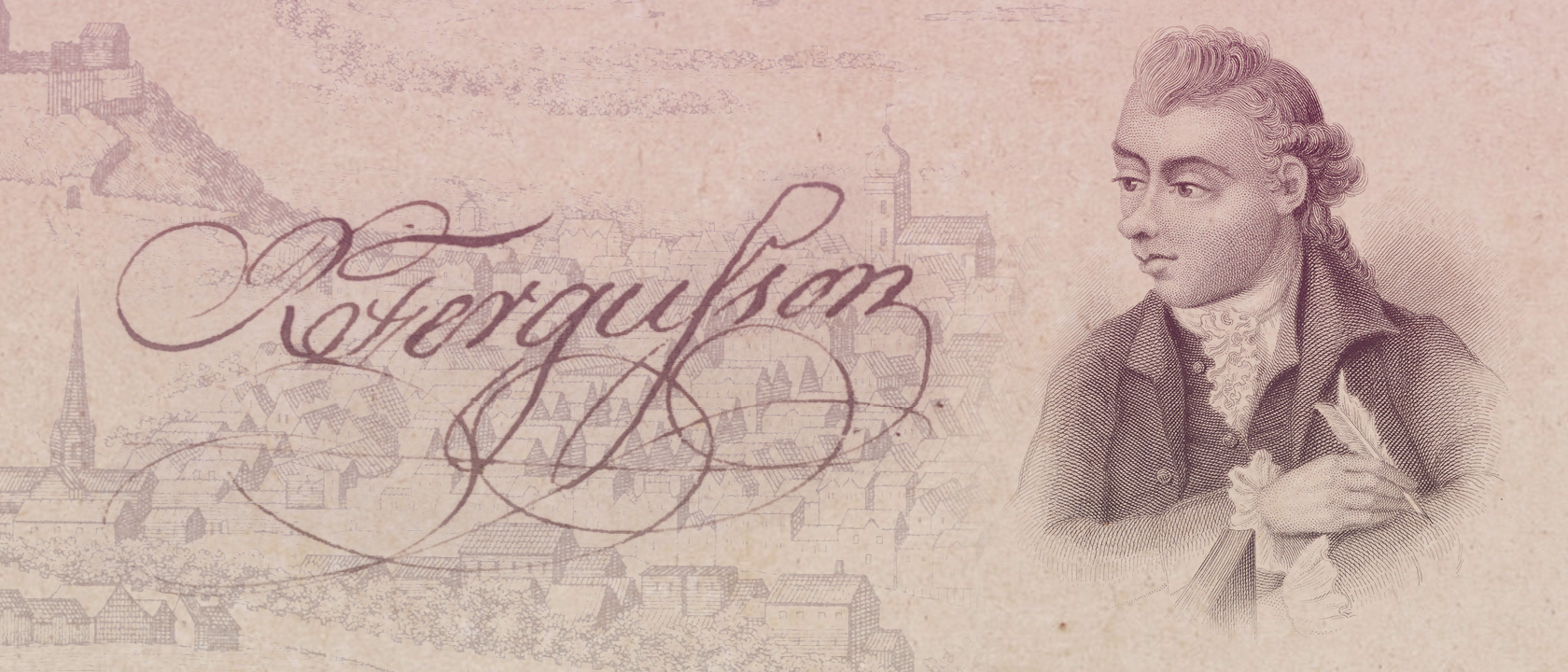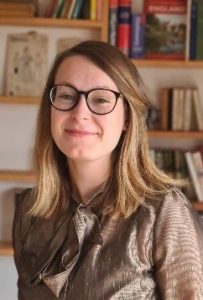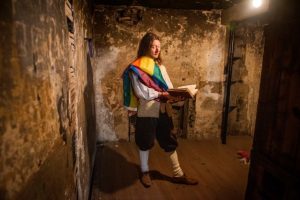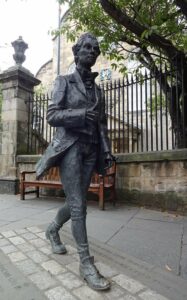Q&A with Dr Amy Wilcockson

As we commemorate the 250th anniversary of Robert Fergusson’s death in 2024, we are excited to introduce a brand-new interactive experience, “Meet The Poet: Robert Fergusson“, at The Real Mary King’s Close. Fergusson, one of our most captivating tour guides, will come to life in this unique event, part of a series of celebrations happening across Scotland in honour of the poet.

To help bring this experience to life, we’ve worked closely with Dr Amy Wilcockson, a Research Assistant on ‘The Works of Robert Fergusson: Reconstructing Textual and Cultural Legacies’ Leverhulme Trust-funded project at the University of Glasgow. Find out more about the project at the website here: https://robert-fergusson.glasgow.ac.uk/
Read our interview with Dr Amy Wilcockson to find out more about her involvement in the University of Glasgow’s project and learn more about Robert Fergusson’s poems.
-
Could you tell us more about your role as a Research Assistant at the University of Glasgow in ‘The Works of Robert Fergusson: Reconstructing Textual and Cultural Legacies’ project?
Hi everyone, my name is Amy Wilcockson, and I’m lucky enough to be working on this great project with Professor Rhona Brown at the University of Glasgow. In my role as Research Assistant, every day is different! The project is focused on commemorating 250 years since the Edinburgh poet Robert Fergusson died on 17th October 1774. To do this, it’s split into two parts.
The first half of the project is textual, as we’re putting together a new edition of Robert Fergusson’s poems. The last version was in 2000 and didn’t include all of his poems. We’re editing a comprehensive edition of Fergusson’s poetry, of all the poems in both English and Scots and are also using the magazines which Fergusson published initially as our source texts, which is exciting as it’s the first time these magazines have been used in this way. So some of the time, I’m in archives, including the Mitchell Library in Glasgow or the National Library of Scotland in Edinburgh, looking at different manuscripts or these very old magazines from the 1770s, taking photos or transcribing the poems directly from the sources. I’m also looking at all the different editions of Fergusson’s works to see which specific poems were included in each one and how they all differ over time.
The second half of the project is our events programme with our lovely project partners. So we’ve got a really extensive events programme happening, from an exhibition at the Mitchell Library to celebrations at St Cecilia’s Hall with the Scottish Poetry Library, to the amazing ‘Meet the Poet: Robert Fergusson’ events that we are running with yourselves at Real Mary King’s Close! I spend some of my time emailing, organising, and scheduling events with the help of RMKC and others!
Overall, it’s a very fun way to spend my days, and I feel very grateful to be working on the project and learning more about Fergusson.
-
What drew you to Robert Fergusson’s work, and why do you think his poetry remains significant 250 years after his death?

I didn’t actually know anything about Robert Fergusson until I came on one of The Real Mary King’s Close’s (RMKC) Pride Tours in June 2023! On the tour I remember hearing about this amazing poet who died so tragically, and I then went home and read a few of his poems as the great storytelling of the RMKC guide had really caught my interest. I finished my PhD at the University of Nottingham in August 2023 (which was on another Scottish poet, Thomas Campbell), and saw Rhona was looking for a Research Assistant on this project. I was drawn to Fergusson, I think, primarily because of his interesting biography, but then I got sucked into his fantastic, lively poetry.
I think Fergusson is still significant to readers in 2024 because he focuses on the everyman in his poems. For example, his poem ‘The King’s Birthday in Edinburgh’ sounds like it should be about King George III, but instead it’s about how everyone else in Edinburgh reacts on the king’s birthday. It’s about the young people and their raucous parties, where people’s wigs are set on fire! He also discusses Edinburgh in an earthy way and conjures up a real sense of the city and its inhabitants. His poems are quite easy reads I think.
We try not to talk about Robert Burns on this project as Fergusson has long been in Burns’ shadow, but Fergusson was a huge influence on Burns’ work. When Burns didn’t want to write any more, Fergusson’s poetry reinvigorated him, and he decided to continue writing. How cool is that? There would be no Burns without Fergusson.
-
What discoveries have surprised you the most while working on this project? Have there been any particular pieces of Fergusson’s work or aspects of his life that have stood out to you?
I think one of the things that has surprised me is how much I’m enjoying the Scots! I’m English, and at the start of the project, it was quite challenging at times to understand the Scots language as I was unfamiliar with it. I feel like I’m getting there a bit more now nearly a year in, and enjoying the intricacies and humour of the Scots in Fergusson’s poems.
The richness of Fergusson’s verse has stood out for me too. He only wrote just over 100 poems, with 80 of them published in his lifetime (mostly in an Edinburgh magazine called the Weekly Magazine). I think that for someone who died when he was just 24, this is an amazing collection of poems, written in a range of styles and on a variety of subjects. He was incredibly prolific and ended up publishing a poem in pretty much every issue of the Weekly Mag in 1773. I think that’s simply incredible, that this young man had the confidence and the ability to essentially become Edinburgh’s (and Scotland’s) unofficial poet laureate of the late eighteenth century.
-
Fergusson’s poetry often reflects the social and cultural atmosphere of 18th-century Edinburgh. How do you approach contextualising his work for modern audiences?
This is a great question! I think people who aren’t as familiar with the language can often feel intimidated by the Scots (like I did). Fergusson very helpfully included in his edition of Poems published in 1773 a great glossary of Scots. There’s also online Scots language dictionaries people can use to help them with some of the vocabulary. Also, despite being thought of as a Scots poet, 60% of Fergusson’s corpus is in English – so don’t be scared, give him a read!
As for the poems themselves, whilst they were obviously written over 250 years ago, many of them are timeless, I think. Edinburgh really hasn’t changed that much since the 1770s!! We can recognise the history and culture of the city in Fergusson’s poems, but the lively dialogue in his poems is completely contemporary. In our edition of Fergusson’s poems, if there are any really big historical or political moments that he’s referring to in his poems, we will be explaining this context very clearly in the notes to the poem too.
-
How do you hope this project and the accompanying events will impact the public’s understanding and appreciation of Fergusson’s legacy?
I would hope that people will be as intrigued by Fergusson as I was! His life is fascinating: he was quite often ill as a child but academically gifted, and he received scholarships to study at Dundee High School and the University of St Andrews. He then came back to Edinburgh on his father’s death to support his family, worked as a clerk, but wrote these incredible poems as a side hustle effectively! He had periods of depression too, and was feeling well again before a fall down steps left him with (what we now know was) a brain injury that sent him to Edinburgh’s Bedlam asylum. He died there a few months later aged just 24. It would be great for more Edinburgh folk, and for those wider afield too, to learn a bit more about Fergusson and his life, as it is so interesting.
I think the thing I would like people to take away from the project the most, though, is that Fergusson really was a phenomenal poet who has influenced so many other poets and writers (including Burns, Robert Garioch, Robert Louis Stevenson, Edwin Morgan, Tom Leonard, Kathleen Jamie, Meg Bateman, James Robertson, and many many more). Despite only six years of writing poems, his work has inspired so many others. I can’t think of anyone off the top of my head who has such a hard-hitting list of people who they’ve influenced!
Also, I think it would be fantastic for people to learn more about Fergusson’s legacy on mental health and welfare in Scotland today. Andrew Duncan, who was a prominent doctor at the time, decided to improve asylum facilities after witnessing the less-than-ideal conditions Fergusson was living in when he died. Duncan began fundraising for a new asylum in Edinburgh in 1792, which opened eventually in 1813. This institution is now the Royal Edinburgh Hospital, which also houses a Robert Fergusson Unit that is dedicated to treating brain injuries. Despite such a short life, Fergusson was certainly very impactful on literary and cultural legacies in Edinburgh and beyond.
-
Robert Fergusson is a central figure in The Real Mary King’s Close Tours. How do you think he would feel about being remembered as part of a historical tour in Edinburgh today?

He is indeed one of the tour guides, with a starring role also in the Pride tours! Rhona and I are so excited that RMKC have also planned these amazing ‘Meet the Poet’ tours to actually ‘meet’ Fergusson in the flesh, write poetry, and have a dram with him. I think Fergusson would possibly be slightly bemused by the idea of being immortalised in this way, but be won over in the end by the sense of fun of the whole thing (and the whisky would probably help too!). I also love the fact that your tours are so grounded in history and meticulously researched, I think he’d appreciate that too.
Fergusson actually was quite acclaimed in his lifetime, he had people writing poems to him telling him how good he was and how much they enjoyed his work. So I think he’d secretly probably be quite proud too. There aren’t many other Edinburgh figures who are still remembered in this way 250 years after they died!
-
For those unfamiliar with Fergusson’s work, what would you recommend as a starting point to appreciate his contributions to Scottish literature?
I think Fergusson’s poems are great in both English and Scots. If you’re reading Fergusson and you haven’t before though, some of my favourites are ‘Braid Claith’ and ‘The Daft-Days’, both in Scots, and both written in the really vibrant voice that epitomises Fergusson’s poems. A funny one in English is ‘To Dr Samuel Johnson – Food for a New Edition of his Dictionary’. Fergusson really didn’t like Samuel Johnson (who put together a famous dictionary), and in this poem uses lots of ironic and satirical nonsensical vocabulary not included in the dictionary to make a point! Great poems about Edinburgh are ‘Auld Reikie’, ‘Leith Races’, and ‘The Ghaists’, the latter where two ghosts in a kirkyard are discussing key ongoing political debates (not what you would expect them to be doing!).
I would definitely suggest giving Fergusson a try – his poems are spirited, vivacious, interesting, lively, and often very funny! Celebrate 250 years of his life by reading his work – and coming along on RMKC’s fabulous tour to meet the man in person too of course!









